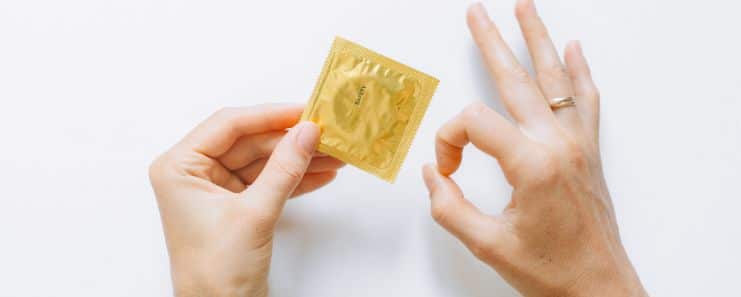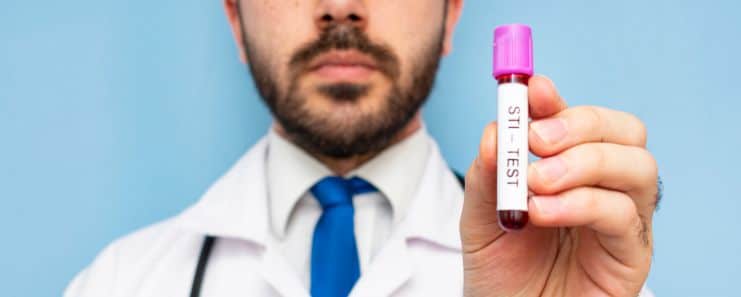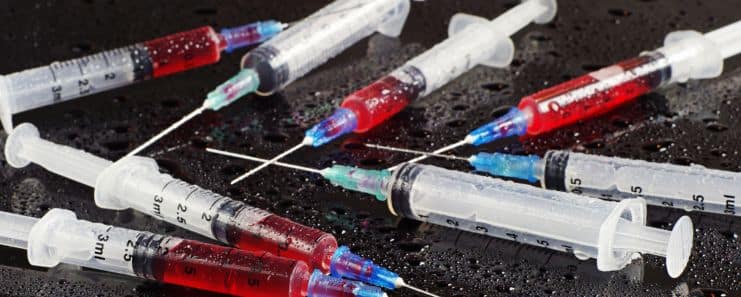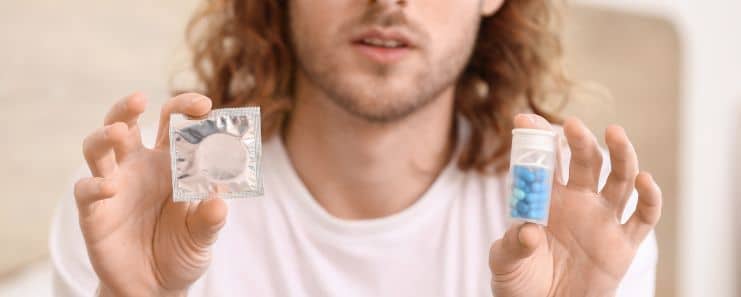Sexually transmitted diseases (STDs) commonly referred to as sexually transmitted infections (STIs) are serious illnesses that can develop after having sex. Burning and itching in and around the genital area are common signs and symptoms of STDs. Many STIs can be treated though not all of them can be completely cured.
In addition to being transmitted through bodily fluids like blood saliva and mucus, STIs can also be transmitted through vaginal anal, or oral sex and these are the reasons why STD happens. An STI is the first stage of an infection before it develops into a more serious illness frequently with no symptoms. Lower abdominal pain, painful urination, strange discharge, and sores or bumps on the genitalia are possible signs and symptoms of STD.
If you think you may have a sexually transmitted infection (STI) or if you are experiencing symptoms. If you engage in sexual activity it’s also a good idea to get regular checkups to stay healthy and identify any infections early. In this blog, we will talk about STDs and how they spread.
What is STD And What Causes It?

Sexually transmitted infections (STDs) are illnesses brought on by infections that are transferred during sexual activity. Sexually transmitted infections (STIs) are the term used to describe these illnesses.
Viruses, bacteria, or parasites can all cause STIs. They are mostly transmitted by sexual activity such as oral sex and intimate relations. STIs can be found in blood, semen, vaginal fluids, and other bodily fluids. STIs can also spread non-sexually through sharing needles, blood transfusions, or mother-to-child transmission during pregnancy or childbirth; these too can be one of the reasons why STD happens.
Three Factors Primarily Cause STIs And STDs
1. Bacteria: Gonorrhea syphilis chlamydia etc are some common causes of Sexually Transmitted Diseases.
2. Viral infections: Zika hepatitis B cytomegalovirus (CMV) human papillomavirus (HPV) herpes and HIV/AIDS etc.
3. Parasites: Trichomonas is one type of parasite as are insects such as scabies mites and crab lice.
Even when ejaculation is absent sexually transmitted infection (STI) can still spread. HIV and hepatitis are among the other infections that can be spread through sharing contaminated needles or using soiled body piercing or tattoo equipment.
Reasons Why STD Happens
1. Having Unprotected Sex

The risk of having an STD is increased when condoms or dental dams are not used during vaginal anal or oral sex it could be one of the reasons why STD happens.
For example, unprotected intercourse with a partner who is infected can quickly spread infections. To lower your risk always use a condom or dental dam.
2. Having Multiple Sexual Partners
You must be thinking what causes STDs? Well, having multiple sexual partners increases the chances that you will come into contact with an STD carrier.
Your partner should have had at most one previous partner; risk is still involved even in committed relationships. Additionally, understanding why you should pee after sex is important, as it helps to flush out bacteria from the urinary tract, reducing the risk of infections.
Tip:- Having regular testing and talking about your partner’s sexual history are important.
3. Having History of Sexually Transmitted Infections

You are more likely to have another STD if you have had one in the past. This higher risk results from the possibility that the previous infection weakened or compromised your body which makes it simpler for new infections to spread this can be one of the reasons why STD happens.
It’s important to continue practicing safe sexual behavior which includes using condoms regularly and having honest conversations with your partner about sexual health.
Tip:- Make sure you and your partner are tested before starting any new sexual activity. You can maintain control over your sexual health by taking a proactive stance.
4. Forced Sexual Interaction i.e Rape or Assault
One main cause of STDs can be rape and other sexual assaults can result in sexually transmitted diseases or STDs. After such an event it’s important to get medical help right away to make sure you get the support treatment and testing you need.
Doctors can provide medications to prevent specific infections, perform screenings to find any possible sexually transmitted diseases, and provide psychological and emotional support to assist in overcoming the trauma.
5. Drug or Alcohol Abuse
You may make unsafe sexual decisions when under the influence of alcohol or drugs. When under the influence people may neglect to use condoms or dental dams or may decide not to use them at all and it could be the cause of STDs in males.
This raises the possibility of catching or spreading STIs or sexually transmitted infections. Moreover, poor decision-making about consent or partner selection can also arise from this type of judgment which increases risk even more.
Tip:- To protect your health, avoid combining drug or alcohol use with sexual activity.
6. Sharing Needles With The Infected Person

Sharing needles is a significant risk factor and also one of the important reasons why STD happens. A direct exchange of body fluids including blood which may contain these viruses occurs when needles used to inject drugs are shared.
Therefore, it’s important to never share needles, syringes, or any injecting equipment with others. Always use clean needles and ensure proper disposal of used ones to prevent the spread of infections. Additionally, it’s important to know how to dispose of condoms properly to maintain hygiene and prevent further health risks.
Tip:-If you or someone you know uses injectable drugs, consider seeking out a needle exchange program in your area for a safer and healthier way to manage substance use.
7. STD Can Be Caused At a Young Age
Sexually transmitted infections (STDs) are more likely to affect people between the ages of 15 and 24. This age group frequently does not know enough about safe sexual practices so they might act riskily without fully realizing the possible repercussions making it cause of STDs for females.
Furthermore, it can be awkward for young people to talk to partners or adults about their sexual health which could result in misunderstandings and inaccurate information. Teenagers can make educated decisions about their sexual health when they are given accurate age-appropriate information about STD prevention transmission and safe sex practices.
It’s important to know how to discuss STDs with teenagers to ensure they receive the correct information and feel comfortable seeking guidance.
8. Men Using Erectile Dysfunction Drugs

A higher risk of sexually transmitted infections (STDs) may be experienced by men who use drugs like Cialis or Viagra. Increased sexual activity without taking the required safety measures like regularly using condoms is the reason why STD happens.
Even though these drugs can improve a person’s sexual performance, it’s still important for them to prioritize safe sexual behavior. The effects of erectile dysfunction medications can increase sexual activity which can give some men a false sense of security and make them forget to use condoms or other forms of protection.
Tip: Regardless of whether you are taking these drugs, always use condoms to lower the risk of spreading STDs.
9. Absence of Symptoms in People
Asymptomatic infection is the term for the state in which many sexually transmitted diseases (STDs) can exist without showing any symptoms. Since many sexually transmitted diseases don’t have obvious symptoms people can spread them unknowingly making it a reason why STD happens.
For instance, a person infected with gonorrhea or chlamydia may not exhibit any symptoms but they can still spread the infection through intercourse. Early detection of asymptomatic STDs is largely dependent on routine testing.
Tip: If you engage in sexual activity don’t wait for symptoms to show up before getting tested for STDs.
10. Poor Sex Education
Sexual activity without regular screenings can raise the risk of sexually transmitted infections (STDs) that go undiagnosed. An increased risk of transmission can result from ignorance of safe sex practices such as using condoms appropriately. People who don’t know how to use condoms properly for example may be more susceptible to STDs and this could be one of the reasons why STDs remain undiagnosed.
To lower the risk of STD transmission sex counselling is essential. Knowing safe sex practices gives people the ability to take charge of their sexual health and prevent STDs by making educated decisions.
Conclusion
Anybody who has an active sex life can get sexually transmitted infections (STIs) and diseases (STDs) which are serious health concerns . The causes of STDs for males and STDs for females are the same so knowing the dangers and taking precautions to keep you and your partners safe is essential. The spread of these infections can be stopped by following safe sex practices such as using condoms and visiting the doctor frequently.
To maintain sexual health communication and education are essential. To reduce the risk of transmission it can be achieved by being aware of the signs and symptoms of STIs and by being transparent with partners about health and sexual history.
You can prevent STDs through early detection and treatment by being proactive and knowledgeable about your sexual health. Maintaining your sexual health involves more than just avoiding STIs—it also involves your general well-being. If you become ill or think you may have been exposed to a sexually transmitted infection consult a doctor. You can have a happy and healthy sexual life if you know what to look out for and take the appropriate safety measures.
Frequently Asked Questions
1. How to prevent STIs?
When having vaginal anal or oral sex always use condoms correctly to prevent STIs such as gonorrhea, chlamydia, and HIV. Limit how many people you have sex with. Vaccinate yourself against HPV. Do not exchange needles. If you have a sexual life, get tested frequently.
2. What are the signs and symptoms of sexually transmitted diseases??
STDs frequently cause burning itching, strange discharge, painful urination, and sores or bumps on the genital area. Some individuals may also feel pain in their lower abdomens. But a lot of STDs can be asymptomatic meaning they don’t even cause any symptoms. For those who engage in sexual activity, it’s critical to get tested frequently because it’s possible to have an STD without realizing it.
3. What happens when you leave an STD untreated?
Serious health problems such as infertility organ damage and an elevated risk of HIV can result from untreated STDs. They could result in long-term discomfort, pregnancy difficulties, and even potentially fatal diseases like cancer. Long-term effects may have a negative influence on general health and life satisfaction.
4. Can STDs be cured?
Antibiotics can treat certain STDs such as syphilis gonorrhea and chlamydia. Others such as HIV and herpes can only be controlled with the right medical care but cannot be cured. And if you are wondering if are STDs curable then yes by managing and stopping the spread of sexually transmitted diseases and by early detection STDs can be cured. Rest for further any information please consult a doctor.
5. What are the reasons for undiagnosed STDs?
STDs are frequently misdiagnosed as a result of stigma, lack of symptoms, and restricted access to healthcare. A lot of people shy away from tests because they are afraid or ashamed. The problem is exacerbated by self-diagnosis and misconceptions about STD transmission which postpone necessary medical care.
6. What are ways to prevent STDs?
Using condoms and dental dams during vaginal anal and oral sex is the best way to practice safe sex and prevent STDs. To lower risk you should limit the number of sexual partners you have and have honest conversations with them about sexual health. To guarantee early detection and treatment routine STD testing is necessary. When using needles always use clean ones and refrain from sharing.
Note – This article is just for awareness purposes, just in case you have any issues related to your health kindly visit your nearest doctor and do not assume anything on your own.
People Also Read:
How to Discuss STDs With Teenagers
Selecting Best Condom For First Time
















